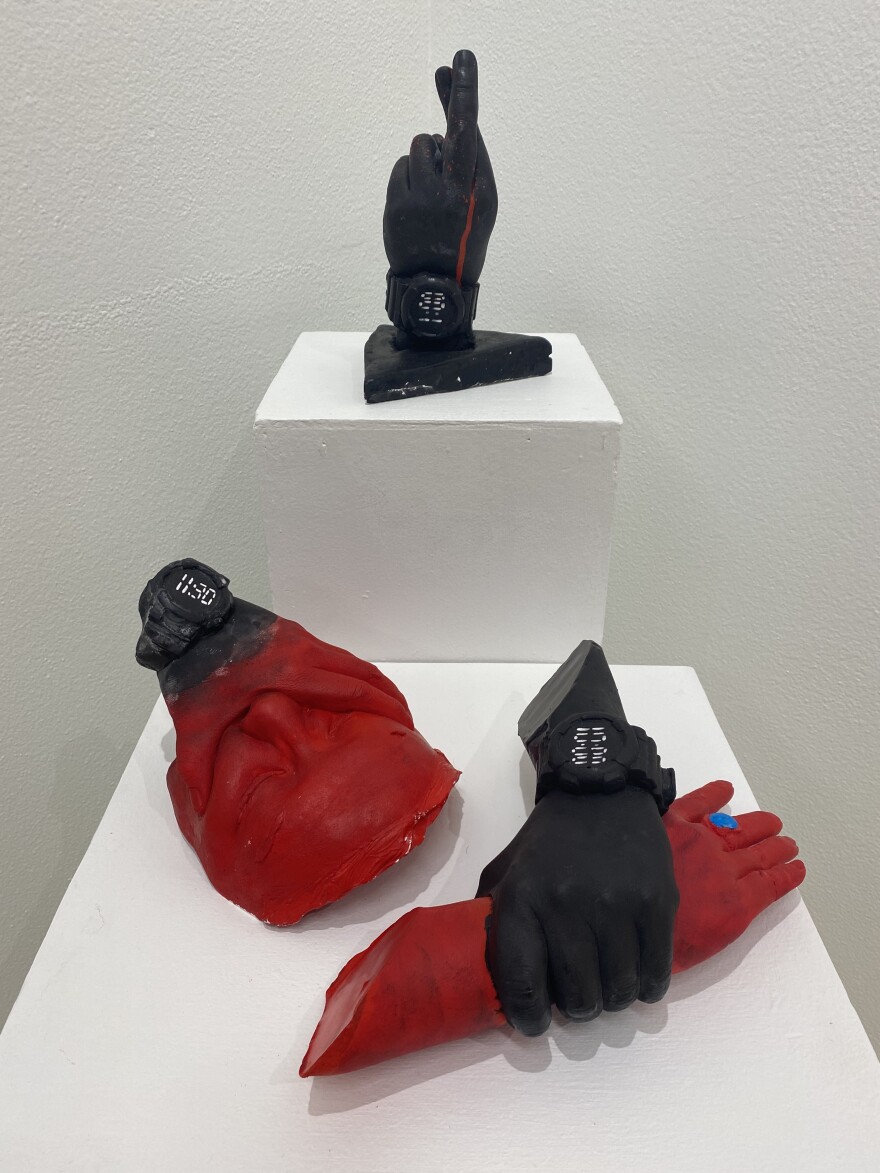In 2016, the National Crime Information Center reported nearly 6,000 cases of missing American Indian and Alaska Native women and girls. That’s according to a study from the Urban Indian Health Institute.
Researchers say the numbers could be higher.
An exhibition at the Walker’s Point Center for the Arts in Milwaukee aims to put the issue in front of more people. It’s called "No More Stolen Sisters."
Walking into the exhibition, there's a poem on the wall called "Poem On Disappearance" written by a former Wisconsin poet laureate.
Valaria Tatera shows off the exhibition, saying it calls attention to the crisis of missing and murdered Indigenous women and girls.
Tatera is a member of the Bad River Band of the Lake Superior Chippewa. She’s one of the show’s curators and a featured artist. Teresa F. Faris, a professor at the University of Wisconsin-Whitewater, is the other curator.
Tatera says she’s been wanting to do an exhibition on Missing and Murdered Indigenous Women, Girls and Two-Spirits, or MMIWG2S. "Two-Spirit" refers to a wide range of sexual and gender identities of American Indian and Alaska Native people.
"The intention is to bring awareness to the crisis and hold space for the MMIWG2S and their families. I think it’s essential that we understand that the connection between the commodification and exploitation of Indigenous lands leads to the commodification and exploitation of Indigenous people," Tatera says.
The show features Indigenous artists from across North America and U.S. territories and allies, and includes works made from metal, clay, mixed media and more.
Tatera shares data on the issue of missing and murdered Indigenous women and girls. "A National Institute of Justice study found that four in five American Indian and Alaska Native women have experienced violence in their lifetime, so that’s about 84%. And from that 84%, half of those women have experienced sexual violence," she says.
Tatera adds that the U.S. Department of Justice found that American Indian women face murder rates that are more than 10 times the national average.
The "No More Stolen Sisters" artwork fills two rooms of the Walker’s Point art gallery. In the first room, Tatera showed a piece called Baggage.

"It has an Indigenous woman in her regalia, printed on a black trash bag with a red modern purse, and her face has a barcode on it," Tatera says. The barcode might be alluding to Indigenous women being commodities.
Another eye-catching piece in the rear of the room is a red dress on a hanger against the wall. On it are embroidered words, some with small beads and some with thread. It’s called Spider Silk Dress.
Tatera read a portion of the text: "Spiders in my brain spin stories of my women. the women my womb the god belly spin web of text."

As you walk through the hall, there are works along the walls leading to a second space.
There are several acrylic paintings of faceless Indigenous women dressed in regalia. According to the artist, Harmony Hill, they’re intended to represent the grace, beauty and strength of native women beyond individual identities and tribal regions.
When you walk into the second space, there is a prominent piece against the wall made of 500 individual pieces of red ribbon, each stamped with the word "justice."
It’s one of Tatera’s works. She says each ribbon represents one of the missing.
I also was drawn to an installation in the corner of the room called When She Goes Missing.

"And it has three hands. One is grasping another hand that is red, and the watch says 10. Another is a hand over a face; the watch reads 11:30. And the last is a hand with the fingers crossed, blood dripping down to the watch, and the watch reads 1:00 a.m," Tatera says.
Tatera says she wants people who see the "No More Stolen Sisters" exhibition to know that Indigenous women are not invisible.
She says the issue of Missing and Murdered Indigenous Women, Girls and Two-Spirits is a crisis. It is a movement. And Indigenous women and girls are resilient.
"No More Stolen Sisters" is on display at the Walker’s Point Center for the Arts until March 11.
Do you have a question about race in Milwaukee that you'd like WUWM's Teran Powell to explore? Submit it below.
_



